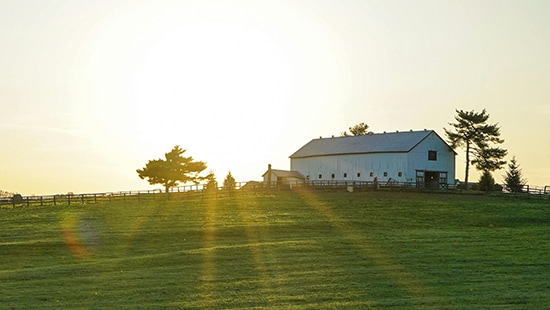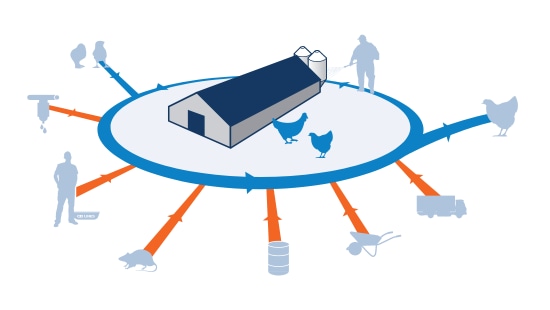
Übertragung und Prävention der Afrikanischen Schweinepest
Die Afrikanische Schweinepest ist eine hochansteckende, sich schnell ausbreitende und tödlich verlaufende Viruserkrankung von Haus- und Wildschweinen. Es gibt weder einen Impfstoff noch ein Heilmittel.
ASP bedroht die Produktion und die Existenzgrundlage von Schweinezuchtbetrieben und Landwirte müssen proaktiv vorgehen und bewährte Methoden zum Schutz ihres Viehbestands anwenden.
Erfahren Sie, wie die Afrikanische Schweinepest übertragen wird und welche Maßnahmen Sie ergreifen können, um eine Einschleppung der ASP in Ihren Betrieb zu verhindern.
Afrikanische Schweinepest bei Schweinen
Das ASP-Virus haftet an Kleidung, Equipment und Fahrzeugen und überlebt in Tierfutter, Wasser und Fleisch.
Schweine infizieren sich mit der Afrikanischen Schweinepest durch Folgendes:
- Direkter Kontakt mit einem mit ASP infizierten Tier oder Schlachtkörper
- Ein Biss von einer Lederzecke (spezifisch für Afrika)
- Der Verzehr von Küchenabfällen, Lebensmittelresten oder Fleischprodukten von Tieren, die mit ASP infiziert sind
- Kontaminierte Materialien von Jägern, landwirtschaftliche Materialien oder Transportfahrzeuge
- Übertragung durch Stechinsekten
Symptome: hohes Fieber, Appetitlosigkeit, Lethargie, Hautblutungen und blutiger Durchfall; akute Mortalitätsrate

Produktinformation
Kontaktieren Sie Ihren lokalen Vertriebsmitarbeiter, um weitere Informationen über die besten Lösungen für Ihre Anforderungen zu erhalten.
Vorbeugung der Afrikanischen Schweinepest bei Schweinen
Ein Biosicherheitsprogramm mit hochwertigen Reinigungs- und Desinfektionsprodukten und -protokollen ist entscheidend, um Ihren Betrieb vor ASP zu schützen.
Die Schlüsselbereiche der Biosicherheit bei der Bekämpfung der Afrikanischen Schweinepest sind Eingangs-, Transport- und Stallhygiene, Trinkwasserhygiene sowie Reinigung und Desinfektion des Wassersystems.
Tipps zur Prävention der Afrikanischen Schweinepest
1. Füttern Sie Ihre Tiere niemals mit Müll, Essensresten oder Hausmüll.
2. Schulen Sie alle Mitarbeiter, Besucher und Lkw-Fahrer in der
Verwendung geeigneter Hygieneprodukte und -protokolle; eine gute Schulung ist der Schlüssel zur Schaffung guter Hygienegewohnheiten.
3. Platzieren Sie Stiefelbadwannen außerhalb des Stalls an jedem Eingang und sorgen Sie dafür, dass Sie aufrechterhalten werden.
4. Stellen Sie sicher, dass Transportfahrzeuge, die zu Ihrem Betrieb kommen, gut gereinigt und ordnungsgemäß desinfiziert werden.
5. Platzieren Sie Desinfektionsbäder und Sprühbögen für Räder am Eingang Ihres Betriebs, um die Einschleppung und Übertragung des Virus durch Lastwagen zu verhindern.
6. Reinigen und desinfizieren Sie Ihre Futtersilos und Trinkwasserleitungen nach jedem Zyklus, damit sich die Viren nicht über Futter und Trinkwasser verbreiten können.
7. Nehmen Sie Proben von Ihrer Trinkwasserquelle, um sicherzustellen, dass sie nicht kontaminiert ist.
Afrikanische Schweinepest – Webinar

ASP mit Biosicherheit bekämpfen
Die Vorbeugung von Krankheiten ist von entscheidender Bedeutung, um eine optimale Gesundheit und Widerstandsfähigkeit von Tieren sicherzustellen. Dabei steht die Biosicherheit an erster Stelle.
Externe Biosicherheit verhindert effektiv eine Einschleppung neuer Krankheiten in den Betrieb. Interne Biosicherheit hilft dabei, bestehende Krankheiten im Betrieb unter Kontrolle zu halten. Wir bei Ecolab haben Experten, die auf beide Bereiche spezialisiert sind.
Profitieren Sie von einem umfassenden Programm zur Förderung der Biosicherheit, das eine geringe Produktivität, Todesfälle von Tieren, Behandlungskosten, den Einsatz von Antibiotika, ineffiziente Prozesse, unnötige Kosten der Fütterung, kostspielige Tests und Rufschädigungen verhindert.
Verhindern Sie eine Einschleppung und Verbreitung von Infektionskrankheiten und schützen Sie Ihre Produktion und Ihr Geschäft.


